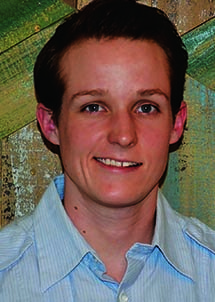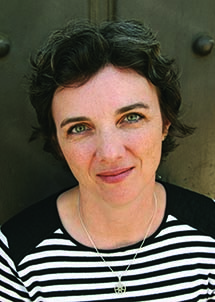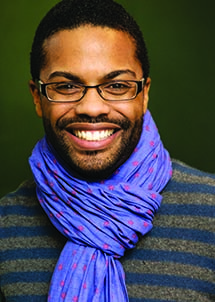Britton Mauk

Profession: Scenic designer
Hometown: Modesto, Calif.
Current home: Pittsburgh
Known for: A freelance scenic designer in Pittsburgh and beyond, Mauk’s recent designs include Wig Out!, Heads, and Of Mice and Men for Pittsburgh Playhouse, and The River for Quantum Theatre—a site-specific work on an old dry boat dock garage with a river running through it. “If I don’t challenge myself intellectually and emotionally for a design, it is an opportunity lost,” says Mauk. He’s also involved in the Gateway Mentor Program at the United States Institute for Theatre Technology, because he’s passionate about diversity and inclusion. “I want to be able to look across the room and see stories similar to mine,” says Mauk. “As a trans man, I feel it is important that I remain visible for folks starting out.”
What’s next: Mauk is currently developing scenic designs for Pittsburgh Playhouse’s The Scottsboro Boys, and in the fall will work on its Uncle Vanya.
What makes him special: Through the 2016 Gateway Mentor program, David Stewart, the Guthrie Theater’s director of production, met Mauk. “Britton made himself instantly available to not only his mentee, but to the entirety of the team,” Stewart recalls. “Bright, personable, and beyond talented—I love watching him work in the space and look forward to seeing him help Gateway grow and make an impact on our industry.”
Theatrical guide: Mauk’s favorite theatre helps audiences explore new vantage points. “One production may have a statement about LGBTQ culture, while another tackles glutinous politics with a clever musical twist,” he says. “As a designer, I strive to guide the production, the audience, and myself to a deeper understanding.”
Danielle Mages Amato

Profession: Dramaturg and author
Hometowns: Born on the East Coast and raised in the Deep South, she typically calls Houston her hometown
Current home: San Diego
Known for: She’s literary manager and dramaturg at the Old Globe, positions she previously held at Washington, D.C.’s Studio Theatre; she’s a past president of Literary Managers & Dramaturgs of the Americas; and in March she made her fiction-writing debut with a young adult novel, The Hidden Memory of Objects.
What’s next: The Globe’s 2017-18 season. And a follow-up to The Hidden Memory of Objects is in the works.
What makes her special: Old Globe artistic director Barry Edelstein was at first floored upon learning Amato had time to write a novel, but has since realized it makes perfect sense, as dramaturgy and fiction both involve, he notes, “distilling big, complex emotional ideas into understandable and relatable language.” He adds that Amato is “possessed of a real and rich humanity, a bracing and ennobling conviction that stories matter and that our world is made better when we can process it through the lens of art.”
Living the dream: Amato says she imagined the career of dramaturg for herself before she knew it existed. “Luckily a wise teacher gave me the word and told me that’s what I was dreaming and doing,” she recalls. “I love the perpetual learning, the chance to deep-dive over and over again into new worlds and new ideas. But it’s the energy and passion of other theatre artists that really keep me going: collaborators and coworkers, pursuing this work with dedication and making room for each other at the table.”
Harrison David Rivers

Profession: Playwright
Hometown: Manhattan, Kans.
Current home: St. Paul, Minn.
Known for: A 2011 GLAAD award winner, Rivers is best known for his 2010 play When Last We Flew and such recent works as Look Upon Our Lowliness, produced by the Movement Theatre Company in 2013, and Sweet, produced by the National Black Theatre in 2016.
What’s next: Rivers has no fewer than four productions this summer and fall: The world premiere of Where Storms Are Born at the Williamstown Theatre Festival in July, And She Would Stand Like This with the Movement, This Bitter Earth at New Conservatory Theatre Center, and Only You Can Prevent Wildfires by Ricochet Collective.
What makes him special: Jeremy B. Cohen, producing artistic director at the Playwrights’ Center, first met Rivers through the center’s Many Voices Fellowship; Rivers is now doing a three-year stint there as a core writer. Cohen calls Rivers “one of the most extraordinary writers and true artist leaders of our time. The heart of this man—the brilliant mind of this artist… From the moment he arrived here, we all knew we had found a missing piece of the puzzle in this community.”
The work ahead: The size of the task is what keeps Rivers going. “There’s so much work to do,” Rivers says. “There are so many stories to tell; so many stories that still need to be told. Artists—especially today, especially now—have a responsibility to create, to illuminate, to advocate, to challenge; to make ugly, scary, beautiful, honest things. That’s the goal I’ve set for myself. There’s comfort in knowing that I’m not the only one.”
Mary Wiseman

Profession: Actor
Hometowns: Milford, Pa., and Gaithersburg, Md.
Current home: New York City
Known for: She originated the role of Dora in Branden Jacobs-Jenkins’s An Octoroon at Soho Rep and Theatre for a New Audience (TFANA), and she made her Broadway debut as Suzanne in Roundabout Theatre Company’s staging of Thérèse Raquin alongside Keira Knightley.
What’s next: She just closed The Skin of Our Teeth at TFANA and is now shooting “Star Trek: Discovery” for CBS All Access. “I am excited about exploring this different modality of acting,” she says. “In the theatre my work is fueled by an audience’s energy and projected collective emotion, and I use that force to explode my own impulses…On camera I am learning how to use the intense, quiet focus of the set to drive a connection between myself and my scene partner.”
What makes her special: TFANA artistic director Jeffrey Horowitz calls Wiseman “a remarkable artist,” saying that she “finds the extreme existential banana peel in her characters’ worlds. Her voice ranges from a reedy clarinet to a trumpet. Physically, she can flop like a rag doll or slink like a vamp. Her timing is impeccable. But Mary also expresses the inexpressible.”
Deep but funny: Wiseman was drawn to acting because it was a place where she could connect with people and feel more comfortable in social situations—something she didn’t always feel in high school. “I hope to make work that is full of energy, that touches upon deep and life-changing human experiences, and that questions the systems of power that govern us,” she says. “I want to help teach people that beauty is not the most important asset a woman can wield onstage.” She adds, “I also want to make very, very funny jokes!”
Sadiqua Iman

Profession: Director/producer/performer
Hometown: Chattanooga, Tenn.
Current home: Seattle
Known for: As founding artistic director of Earth Pearl Collective, she directed an all-women-of-color Streetcar Named Desire in Chicago to raise awareness of same-sex domestic violence. She also created the persona Namii, a genderqueer burlesque performer, to lead body awareness and empowerment workshops.
What’s next: In November in Seattle, Earth Pearl’s first solo festival, Sovereign, will feature queer black women in all disciplines. Also planned: a tour of We Be Dat, an interactive theatre experience set at an underground community rally.
What makes her special: Christie Walser, executive director of Washington, D.C.’s Project Create, where Iman has worked as teaching artist, said that Iman’s “passion for her artistic practice translates so naturally into her teaching style. I’ve seen Sadiqua enter a room full of adolescent girls who initially had no interest in her or her lesson plan and transform them into excited and enthralled actors and dancers, full of potential and completely devoted to their teacher. Sadiqua is magic.”
Entertain, engage, empower: “Theatre gives me the opportunity to have important conversations that would otherwise be met with hostility or avoidance,” notes Iman, who says her favorite performance genre is musical theatre. “When you are entertained, you cannot help but to engage.” And empower: As someone who had “life-changing” opportunities stage-managing and making costumes, she hopes to “start a trade program for underserved youth to learn technical theatre skills that can lead them to successful careers and opportunities beyond a traditional college education.”
Samuel-Moses Jones
 Profession: Stage manager
Profession: Stage manager
Hometown: Catskill, N.Y.
Current home: Jersey City, N.J.
Known for: Jones served as stage manager for the Broadway stagings of Bring in ’Da Noise, Bring in ’Da Funk, Mamma Mia!, Sweet Charity, and Mary Poppins. He also works on benefit events and fundraisers for Broadway Cares/Equity Fights AIDS and the Actors Fund of America.
What’s next: In July he’ll stage manage the Fire Island Dance Festival with the organization Dancers Responding to AIDS.
What makes him special: Stage manager Sherry Cohen, who’s worked with Jones on Broadway, calls him a true Renaissance man. “He can direct, produce, stage manage, take care of anything, including going shopping at half hour for an actor who forgot his pants for a benefit—that’s a long story,” she says. Cohen also notes Jones’s skills outside the theatre, which include photography and cooking. “He does any and all the above, with the highest professional standards, the best people skills, and the most amazing sense of humor you will ever be lucky enough to encounter.”
What’s my line: Jones feels that wearing multiple hats is part of the stage manager’s job description. He illustrates with a story: “Early in my career, I was on tour with a small production. The show had five cast members, and I was acting as the stage manager/tour manager. After a performance, one of the actors mentioned that he was having vocal problems, so I immediately got him an appointment with a specialist.” In the meantime, Jones “had to deliver his lines and sing his songs offstage with a handheld mic, and still call the cues for the show.”


